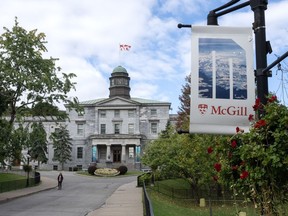With heightened security and restrictions, McGill and Concordia brace for disruptions as pro-Israel and pro-Palestinian groups plan events.

Montreal’s universities are bracing for potential disruptions on Monday, marking the one-year anniversary of the Hamas attacks on Israel, with both McGill and Concordia universities beefing up security measures in anticipation of protests.
“We will not tolerate behaviour that creates a climate of intimidation or harassment,” Anne Whitelaw, Concordia’s provost, and Michael Di Grappa, vice-president of services and sustainability, said in an email sent to the community late Thursday.
Tensions have been rising on Montreal campuses throughout the year, with increasing protests on both sides and clashes with police. Pro-Palestinian encampments were also established at McGill and the Université du Quebec à Montréal (UQAM) over the summer. Earlier this week, protesters broke windows at Concordia’s downtown Hall building, while the windows of McGill’s administration building remain smashed from pro-Palestinian protests during the summer.
Pro-Palestinian groups Solidarity for Palestinian Human Rights (SPHR) at McGill and Concordia posted on social media in September, calling for a “week of rage” during the week of the Oct. 7 anniversary, including renewed demands for McGill to divest from companies with ties to Israel.
What is planned and how are the universities responding?
Jewish group Federation CJA plans to hold a vigil at McGill’s Roddick Gates at 12:30 p.m. Monday to mourn those killed by Hamas on Oct. 7.
Also Monday, SPHR McGill and SPHR Concordia are organizing a march from Concordia to McGill. These groups have called on people to “flood our campuses in response to a year of genocide” and “commemorate the historic breach of the colonial border wall.”
In September, McGill stripped SPHR of its university club status after the group praised Hamas’s attacks last year as “heroic.”
SPHR McGill did not respond to request for comment.
Both McGill and Concordia have taken precautionary steps to handle Monday’s events.
McGill will enforce strict access controls from Oct. 5 to 7. Students and staff will need to provide ID cards, and visitors will be required to show permission letters. Most classes will move online, though exams will continue as scheduled.
Concordia’s buildings will remain open on Monday, but the university has cancelled all events in the downtown de Maisonneuve Blvd. Hall building mezzanine for the week of Oct. 7-11.
Additional measures include increasing security presence, adjusting building access and holding meetings with student leaders to emphasize regulations on civil discourse and peaceful protest.
The university also told The Gazette that it has taken actions, including disciplinary measures for students violating the code of conduct and hosting workshops on anti-discrimination covering topics like antisemitism.
Along with McGill and Concordia, Jenny Desrochers, a spokesperson for UQAM, said that in anticipation of Oct. 7, the university has called for increased vigilance and put in place preventive measures but did not provide details of the measures.
“UQAM is a place of dialogue and respect. We have repeatedly reminded members of our community: hatred, antisemitism, Islamophobia and racism in any form have no place at the university,” Desrochers said in a statement.
She added that the university has invited the community to write messages for peace on Oct. 7 as part of a possible collective work for the university.
At the Université de Montréal, a spokesperson said that debates and discussion on campus over the past year have been respectful.
“We’re confident that next week will be no different,” said university spokesperson Geneviève O’Meara.
Three students at U de M told The Gazette they had not received any communication from their administration about next Monday, and all intend to go to class as normal.
At McGill, a student who spoke to The Gazette said that the campus atmosphere felt “a little tense.”
Another student, who said they are a McGill PhD student, said they have seen an increasing number of security guards outside their building in the past week, but questioned whether they were necessary.
Montreal MP Anthony Housefather, the federal government’s special adviser on Jewish community relations and antisemitism, praised McGill’s efforts, noting the university has shown a “real willingness” to address safety concerns raised by its Jewish students head-on. He said he had been more critical of the administration last year.
However, Barry Eidlin, a sociology professor at McGill, criticized the university’s approach as “not normal.”
“It’s not normal to respond to the possibility of student protest by shutting down campus. It’s not normal to have to go to school on a campus swarming with private security guards,” he said.